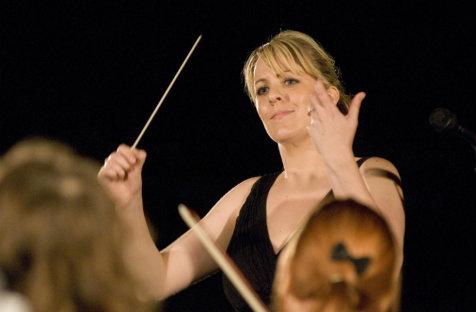In just under 18 months, Perth Symphony Orchestra has gained a reputation for great playing under the baton of Jessica Gethin, a consummate musician who knows how to get the best out of her players.
Gethin’s conducting is superb. She is energetic to the nth degree, but not a skerrick of that energy is wasted. And the orchestra responds with dedication and sheer hard work. After all, if the person up front is giving their all, what can the troops do but offer the same?
This combination has resulted in a fine, if somewhat overly-long, program that showed the performers’ versatility, enthusiasm and sheer talent. All three were evident from the opening bars of Bernstein’s Overture to Candide. The constantly changing time signatures in this piece raise its level of difficulty, but they were handled with aplomb. It was followed by Perth composer Ian Grandage’s fanfare All that Glisters, with the brightening of mood marked by a very effective lighting change from cool to warm colours.
Still brighter lighting heralded the first appearance of coloratura soprano Fiona Cooper-Smyth, of Divalicious fame. Clad in a glamorous red gown, Cooper–Smyth gave us a convincing snapshot of the imperious Queen of the Night from Mozart’s Magic Flute. As we would expect from a singer of her calibre, Cooper-Smyth demonstrated a disciplined command of the technicalities of the famous aria with its bell-like runs and difficult intervals.
We were next treated to a premiere of sorts – PSO is the first orchestra to perform in concert two pieces from the film Love, Actually – the love themes ‘Glasgow’ and ‘Prime Minister’. The original score was provided by the composer, Craig Armstrong, and his trust was not ill-founded. Gethin and her players did his work proud.
Prokofiev’s ‘Montagues and Capulets’ from his Romeo and Juliet ballet featured next. The emphasis is on the powerful Capulet leitmotif. I can never hear this theme without a mental vision of a fierce family, all standing with feet apart in a wide second position, hands crossed at thigh level in the old mime gesture for ‘death’. The PSO’s rendition lacked only Cranko’s choreography to make it perfect.
Then Nina Rota’s famous love theme from The Godfather introduced much-loved Perth accordionist Cathie Travers. This woman is a true virtuoso of her chosen instrument, and she did not disappoint in this lovely arrangement. (I especially liked the Picardy third ending!) Sadly, however, her fingers flew up and down the keyboard in some passages with no audible effect because the orchestra drowned her out.
Another unexpected contrast followed – 14-year-old Lucinda Nicholls sang her own composition ‘Inside and Out’, which was taken up by London’s Magnet Kitchens as their TV commercial! She went all the way to Abbey Road to record it. But once again, we didn’t hear her very well. Like Travers, she was largely overwhelmed by the orchestra.
Another young composer, Kevin Penkin, was featured next, with a performance of his charming opus Blossom Crossroads. This demonstrated some very effective scoring: a solo violin, quickly joined by a cello and then all the strings, led into a strong bass section that lent depth to the piece while providing a nice contrast with fluid harp passages.
The next work brought the Scotch College/PLC Choir to the stage. Their singing of ‘Circle of Life’ from The Lion King was led by Mark Underwood, who also plays trumpet in the WA Symphony Orchestra.
The finale to the first half was the impressive theme from the TV show Merlin (by Rohan Stephenson, a WA composer working in London) stoutly rendered by the PSO.
Here I must pause for breath. The first half alone was well over an hour long, and I noticed several families with young children leaving the grounds of Scotch College at interval. The advertised time was 5pm, but in fact the performance did not start until 6.30pm. It should have been made clear in the advertising that the first hour or so was to be devoted to picnicking on the grass of the lovely Scotch College playing fields, because it turned into one heck of a long night. I suspect there would have been quite a few grisly children to put to bed in some households, especially in those families that held on until the bitter end. Throughout the second half, children were running around, some of them squabbling and crying, and who can blame them? It had also been suggested that patrons should travel by train as parking was at a premium – but trains only leave every half hour at night. My companion and I just missed a train after the show. Fortunately we were able to find a taxi, which was an unexpected expense, but who wants to wait half an hour on a railway station late on a Saturday evening? These logistical problems are going to constitute an ongoing dilemma if PSO continues its partnership with Scotch College. Well over a hundred performers and an audience of 2,700 souls, many of them children, present a logistical nightmare, and a solution will not be easy to find.
Nevertheless, there was a second half to hear, so, fortified with coffee, we took our seats again, to be regaled by the brass and percussion sections of the orchestra giving us Aaron Copeland’s Fanfare for the Common Man, followed by the grand finale of Elgar’s Enigma Variations. The almost Mendelsohn–esque introduction showed a nice contrast to subsequent complex harmonies from the brass and string sections, further demonstrating the skill and versatility of this fine body of musicians.
Fiona Cooper-Smyth returned to the stage to give us a beautiful rendition of the Irish folk song ‘She moves through the fair’. A poignant introduction by a solo flautist gave way to an impeccable à cappella performance of this sad song.
But what a change we had in the next number! ‘Nothing Else Matters’, Metallica’s power ballad from their eponymous fifth album, was orchestrated by the conductor Jessica Gethin and featured Ray Walker on electric guitar. This is a surprisingly melodic composition compared to much of Metallica’s work.
In a complete change of pace, recent WAAPA graduate Roberto Abate demonstrated excellent breath control in ‘Nessun Dorma’ from Turandot, surely the best-known tenor aria in the operatic repertoire. Abate started somewhat hesitantly, but soon fell under Puccini’s spell and gave us a beautifully expressive interpretation. He is off to Cardiff soon for further study at the Wales International Academy of Voice.
Bass trombonist Kieran Hurley created a piece called Australian Bagpipe Medley, which incorporated the AC/DC number ‘It’s a Long Way to the Top (If You Wanna Rock ‘n’ Roll’) and ‘You’re the Voice’, made famous by John Farnham. These songs were performed by Mark Underwood with backing singers Danae Perkins and Shannon Marshall – both from the Australian Army Band Perth – supported by ex-Scotch man Liam Salter on bagpipes. Gethin had earlier confided (if one can confide to 2,700 people) that she had a seven-week-old baby backstage. This medley would almost certainly have wakened the infant!
Underwood returned to the stage for the next item, ‘All I Ask of You’ from Phantom of the Opera, in a duet with Fiona Cooper-Smyth. Although their voices blended well, the piece is not, perhaps, the best vehicle for a singer whose true metier is obviously rock ‘n’ roll, as is the case with Underwood.
‘Highland Cathedral’ became Scotch College’s school song in 1991, permission to use the tune having been granted by its German composers, Ulirich Roever and Michael Korb, who composed the melody in 1982 for a Highland Games held in Germany. It was given a rousing rendition here by the Scotch College Pipe Band and the same choir that appeared earlier in the program. Sadly, the choir was almost drowned out by the orchestra. It would appear that the sound was set up nicely for the stage behind the podium, but not for the downstage area where the soloists and choir sang and played. However it was entertaining to watch two clever young drummers who accompanied the pipers – they had the art of stick-twirling down pat!
At last, the final number – ‘Jupiter’, from The Planets, the ever-popular suite by Gustav Holst. The woodwind players, who had been unseen and largely unheard for most of the program, finally had a chance to shine. I also loved the enthusiastic and very energetic tambourine playing in the closing section!
Overall, this program more than adequately demonstrated the strengths of this orchestra. They appear to be low on woodwinds (although the players they do have are very good) so they have focused mainly on arrangements in which this lack will not be too obvious. They are planning a new venture – a spin-off chamber orchestra which will have its first airing on 10 April. This might provide a better showcase for the woodwinds.
I must make special mention of the beautiful Welcome to Country that opened the show. Father and son Phil (Wally) and Isaiah Stark – singer and didgeridoo player respectively – gave us a genuine welcome and a few laughs as well. I must also commend Bourby Webster, founder and director of the Perth Symphony Orchestra, who compered the evening. All the performers must have been exhausted. I suspect that even the indomitable Jessica Gethin was flagging slightly by the time she finally put her baton back in its case. It really was a marathon of an evening, and I hope future programs will be a tad more concise. However, there is no denying that PSO is a fine orchestra, and it is to be hoped that it will long continue to present variety-filled, well-performed musical programs to Perth audiences.
Rating: 3 ½ stars out of 5
AHG presents:
Symphony by the Lake – a Perth Symphony Summer Proms concert
Perth Symphony Orchestra, conducted by Jessica Gethin
Scotch College Playing Fields by Lake Claremont, Perth
9 March




